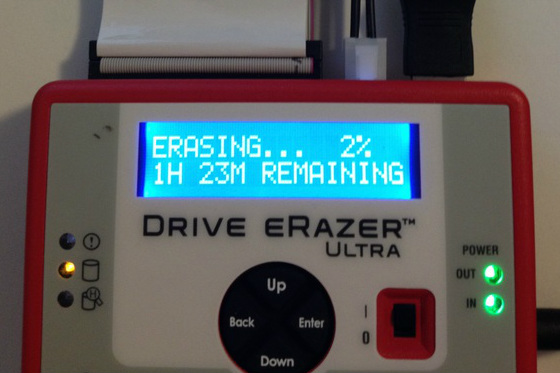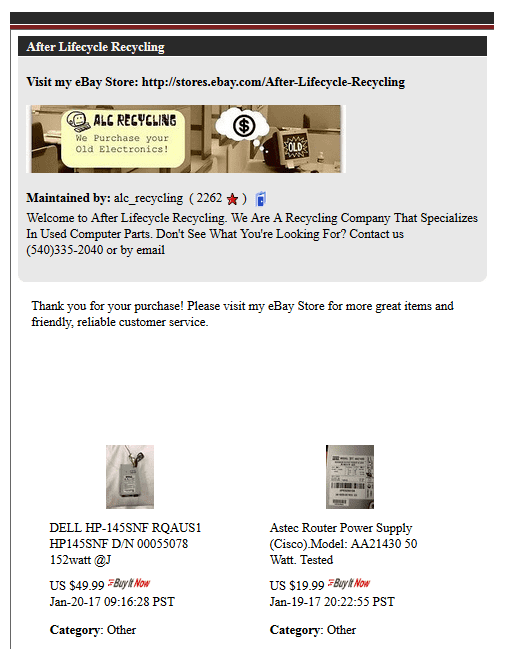What About the Information Stored on my Computer?
Keeping your information safe is extremely important to us. Consumers have the option to request a Certificate of Destruction to ensure the safety of your information. The Certificate of Destruction allows you to confirm the destruction of your information by requesting either a receipt of the wipe or a picture of the hard drive after destruction. Note, without a certificate of destruction there is no way to know which hard drive we destroyed was yours. Regardless of COD, ALC Recycling takes caution to destroy your hard drive information by one of the methods below. However, we encourage you to remove your hard drive before recycling though us. This assures that your information stays within your own protection.
What Methods of Information Destruction do you Offer?
Consumers may choose from four methods of information destruction.
Method 1: Standard 1-Pass wipe or Professional DOD Standard 3-Pass Wipe. Using a professional wipe software, ALC recycling can run either a 1-pass or 3-pass information wipe on your hard drive. After the wipe, a wipe-confirmation can be requested via email or mail. **Requests must be made at time of pick-up or drop-off**.
Method 2: Physical Hard Drive Destruction: This method involves removing the platters from inside the hard drive and physically destroying the information by magnetism and grinding. A picture of the destruction process may be requested at the time of pick-up.
Method 3: Leaving the hard drive with you: Consumers can request that their hard drive be left with them.
Method 4: Send Hard Drive To R2 Certified Recycler (see below for explanation)**
What Items Do You Recycle?
See “Items We Accept”
What Items Do You Not Recycle?
We do not recycle CRT TV's at the present time
What Items Do You Charge To Recycle?
1) CRT Monitors: We charge a flat-rate of $15 for each CRT monitor.
2) Large Floor Model Copiers: ALC recycling charges $75 to recycle large floor-model copiers. Charges will increase if the copier is not easily accessible for hauling. All hard drives within the copiers will be destroyed using one of the methods listed above.
3) CRT TV's: We charge a flat-rate of $50 for each CRT TV.
What Types of Prices Do You Pay For Items?
Email or call for latest pricing.
One of the main advantages of our service is driving to your location and hauling off these old/broken computer and electronic parts, thus freeing up the clutter in your home and saving you gas money and time hauling them yourself. On top of this, we purchase many items by the pound. Prices change rapidly with fluctuations in commodity prices, thus, email or call us for current pricing.
How Does it Work?
Call or email us with the items you would like to discard. We will schedule a pickup (normally within 3-5 business days). At the time of pickup we will weigh the items that we buy and pay you cash. If you are not available on the day of pickup you can leave the items out for us and we will mail you a check.
What Do You Do With These Computers?
We believe that reuse is the best form of recycle so depending on the condition, we may donate, resell, or recycle the items you donate to us.
We are not perfect but we strive to recycle all donated items responsibly. Items are dismantled and segregated by metal and recycled. However, we do not have access to recycle ABS plastics and as of this writing Warren County does not offer recycling for plastics 3-9. We have petitioned Warren County to offer this service and we hope to offer complete recycling in the future.
**What Are R2 Certified Recyclers**
ALC Recycling uses R2 certified recyclers to send hard drives or cell phones that are defective or cannot be read using our wipe software. We also use R2 certified recyclers to recycle the platters for all destroyed hard drives. This adds an added layer of security for an all-ready destroyed hard drive. Here is more information about these certifications.
Why choose an R2 recycler?R2 Practices: Making your IT asset disposal choice easy
According to a recent survey conducted by Converge, IT managers at mid- to large-size companies cite data breach from discarded computers as the number one concern when disposing of IT equipment. Environmental practices, ensuring proper e-waste disposal, and finding asset disposition support for remarketing or reusing equipment were also top priorities listed in this report.
The R2 Standard addresses all of these areas of concern, so you can be sure that your IT equipment is managed according to the highest industry standards while meeting your organizational goals and needs. Every certified R2 recycler has been rigorously audited by an independent third party auditor that evaluates each recycler in more than 50 areas of operational and environmental performance.
Here are just a few examples of how R2 Practices addresses these top corporate concerns that impact decision making when choosing the right IT asset disposal provider:
Data security
- All R2 certified recyclers are required to sanitize, purge, or destroy data on all hard drives and data storage devices.
- Data destruction processes are reviewed and validated by an independent party periodically.
- R2 recyclers are required to have a security program in place that is appropriate for the equipment they handle and the customers they serve.
- R2 defines focus materials, or materials that can pose environmental concern, and outlines how these materials should be managed to ensure environmental and worker safety.
- Requires downstream due diligence on all vendors handling focus materials to ensure materials are handled properly throughout the chain of custody.
- Prohibits the export of equipment and components containing focus materials to developing countries unless the transaction is legal under both the export and import countries’ laws and the receiving facility is state-of-the-art.
- All R2 certified electronics recyclers maintain necessary permits, licenses, and insurance as required by state and federal regulations.
- R2 requires that all recyclers send materials to licensed and permitted facilities.
- Rigorous shipping and material tracking systems are employed by all R2 certified recyclers.
Remarketing and reuse
- Recognizing the importance that reuse has, both environmentally and socially, R2 Practices establishes a “reuse, recover, dispose” hierarchy all along the chain of custody for material handling.
- R2 certified recyclers that test equipment diverted for reuse, and confirm key functions of the unit are working, may export this equipment . Without such testing and confirmation, such equipment must be treated as though it is going to recycling and may not be exported unless the R2 exporting provisions for recycling are satisfied.
- Also recognizing that some clients would not want their equipment remarketed or reused, R2 Practices require recyclers to have systems in place to ensure that all equipment can be recycled, rather than recovered for reuse, if the client wishes.
Click to set custom HTML




